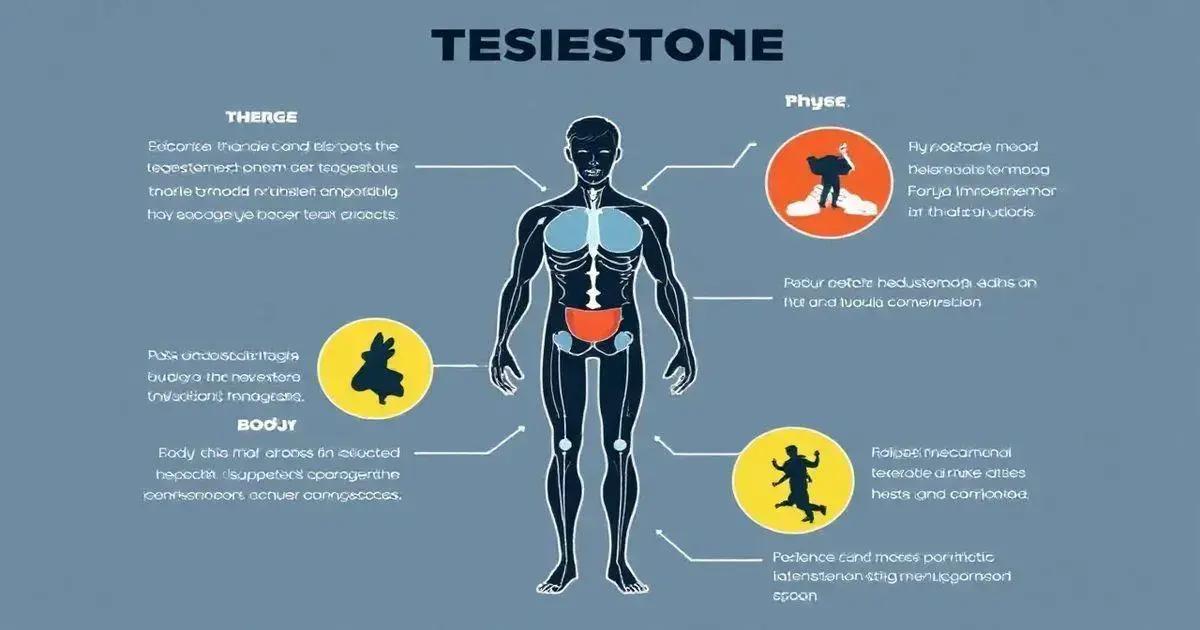To maintain healthy testosterone levels naturally, focus on a balanced diet rich in healthy fats, proteins, and essential vitamins, engage in regular exercise, manage stress effectively, ensure adequate sleep, and consider natural supplements if needed, all of which significantly support hormonal health.
Maintaining healthy testosterone levels naturally is vital for overall well-being. Testosterone impacts various bodily functions, including mood, energy, and muscle mass. Men often seek ways to optimize their testosterone levels without medication. This article explores effective strategies, from dietary changes to exercise regimens, to help promote a healthier hormonal balance.
Understanding Testosterone and Its Role in Health

Understanding Testosterone is crucial for recognizing its role in men’s health. It is the primary male sex hormone, but it also plays a vital role in various bodily functions beyond those typically associated with male characteristics.
Roles of Testosterone in the Body
Testosterone is responsible for developing male physical features, such as increased muscle mass and body hair. However, it also affects mood, energy, and libido. In women, testosterone is present in smaller amounts and contributes to bone strength, mood stability, and overall health.
Symptoms of Low Testosterone
Low testosterone levels can lead to several issues, including fatigue, depression, decreased libido, and loss of muscle mass. Recognizing these symptoms can help individuals take proactive steps to maintain hormonal balance.
How Testosterone Levels Fluctuate
Testosterone levels naturally fluctuate throughout the day and can be influenced by factors like stress, sleep, and diet. Understanding these fluctuations helps individuals identify potential lifestyle changes that could support healthy levels.
In summary, testosterone is essential for various bodily functions, impacting not only physical health but also mental well-being. Recognizing its importance lays the groundwork for exploring natural methods to maintain healthy testosterone levels.
Natural Ways to Increase Testosterone Levels

Natural Ways to Increase Testosterone Levels can improve overall health and well-being. Here are some effective strategies to support healthy testosterone production.
1. Adjust Your Diet
Eating a balanced diet is essential. Include foods rich in healthy fats, such as avocados, nuts, and olive oil. Lean proteins and plenty of vegetables also support hormonal balance.
2. Get Enough Sleep
Quality sleep is vital for testosterone production. Aim for 7-9 hours of restful sleep each night. A consistent sleep schedule can help regulate hormone levels.
3. Manage Stress
High stress levels lead to increased cortisol, which can negatively impact testosterone. Engage in relaxation techniques like meditation, deep breathing, or yoga to manage stress effectively.
4. Incorporate Regular Exercise
Physical activity, especially resistance training and high-intensity interval training (HIIT), can boost testosterone levels. Aim for at least 150 minutes of moderate exercise each week.
5. Maintain a Healthy Weight
Excess body fat can lead to lower testosterone levels. Maintain a healthy weight through diet and exercise to support hormonal health.
6. Avoid Alcohol and Drug Abuse
Excessive alcohol and drug use can negatively affect testosterone levels. Limiting these substances can help maintain hormonal balance.
7. Consider Natural Supplements
Some supplements, like zinc and vitamin D, have been shown to promote healthy testosterone levels. Always consult a healthcare professional before starting new supplements.
By implementing these natural methods, you can effectively boost your testosterone levels and enhance your overall health.
The Impact of Diet on Testosterone

The Impact of Diet on Testosterone is significant. What you eat plays a crucial role in maintaining healthy testosterone levels. Here are some key dietary components to consider.
Healthy Fats Are Essential
Incorporating healthy fats like avocados, nuts, and olive oil supports hormone production. Omega-3 fatty acids found in fish, such as salmon and mackerel, are particularly beneficial for testosterone levels.
Protein Intake Matters
Protein is essential for muscle development and can influence testosterone levels. Lean meats, eggs, and legumes provide the necessary building blocks for hormone production. Aim to include a source of protein in every meal.
The Role of Vitamins and Minerals
Vitamins like D and minerals such as zinc are critical for testosterone synthesis. Foods rich in these nutrients include fortified dairy products, leafy greens, nuts, and whole grains. Supplements may help but consult a healthcare professional first.
Limit Sugar and Processed Foods
High sugar and processed food consumption can negatively impact hormone levels. These foods can lead to weight gain and increased body fat, which may lower testosterone. Opt for whole, unprocessed foods as much as possible.
Hydration Is Key
Staying hydrated is crucial for overall health, including hormone production. Drink plenty of water throughout the day to support bodily functions, including testosterone levels.
By making conscious dietary choices, you can significantly influence your testosterone levels and overall health.
Importance of Exercise for Hormonal Balance

Importance of Exercise for Hormonal Balance is a key factor in maintaining healthy testosterone levels. Regular physical activity can significantly influence hormonal health in several ways.
Boosting Testosterone Through Resistance Training
Engaging in resistance training or weightlifting is one of the most effective ways to increase testosterone. Studies show that compound exercises, like squats and deadlifts, stimulate the production of this hormone.
Cardiovascular Exercise Benefits
Cardio exercise, such as running, cycling, or swimming, also supports hormone balance. Regular aerobic activity helps to maintain a healthy weight, which is essential for keeping testosterone levels in check.
Reducing Stress with Physical Activity
Exercise is a natural stress reliever. Lowering stress levels reduces cortisol, the hormone that can negatively affect testosterone production. Activities like yoga and tai chi are also beneficial for reducing stress.
Improving Sleep Quality
Physical activity can improve sleep quality, which is crucial for testosterone production. Lack of sleep can lead to hormone imbalances, so incorporating regular exercise can help enhance your overall sleep patterns.
Regular Routine is Key
Consistency is vital. Aim for at least 150 minutes of moderate exercise each week, combining different types of physical activity. Being active regularly will significantly contribute to maintaining hormonal balance.
By prioritizing exercise as part of your lifestyle, you create a strong foundation for achieving optimal testosterone levels and overall hormonal health.
In Summary: Maintaining Healthy Testosterone Levels Naturally
Maintaining healthy testosterone levels naturally is essential for overall well-being. By understanding the role of testosterone in health, you can take effective steps to manage it through diet, exercise, and lifestyle changes.
Eating a balanced diet rich in healthy fats, proteins, and essential vitamins can support testosterone production. Incorporating regular exercise, particularly resistance training and cardiovascular workouts, plays a vital role in hormonal balance.
Additionally, managing stress levels and ensuring adequate sleep are crucial factors in maintaining hormone health. By adopting these practical tips, you can promote a healthier lifestyle and optimize your testosterone levels naturally.
Commit to these changes, and you will not only improve your hormonal balance but also enhance your overall quality of life.
FAQ – Frequently Asked Questions about Maintaining Healthy Testosterone Levels Naturally
What are natural ways to increase testosterone levels?
Natural ways to increase testosterone levels include adjusting your diet, getting enough sleep, managing stress, and exercising regularly.
How does diet impact testosterone levels?
Diet plays a crucial role in testosterone production. A balanced intake of healthy fats, proteins, vitamins, and minerals is essential for maintaining hormone health.
Why is exercise important for hormonal balance?
Exercise, especially resistance training and cardiovascular workouts, helps boost testosterone levels, reduces stress, and improves sleep quality, all contributing to hormonal balance.
What foods should I eat to support testosterone production?
To support testosterone production, include foods rich in healthy fats like avocados and nuts, lean proteins, and those high in vitamins such as D and minerals like zinc.
How does stress affect testosterone levels?
High stress levels can lead to elevated cortisol, which negatively affects testosterone production. Managing stress through relaxation techniques is important for hormonal health.
Is it possible to boost testosterone levels with supplements?
Some supplements, such as zinc and vitamin D, may help boost testosterone levels. However, it’s important to consult with a healthcare professional before starting any supplements.













